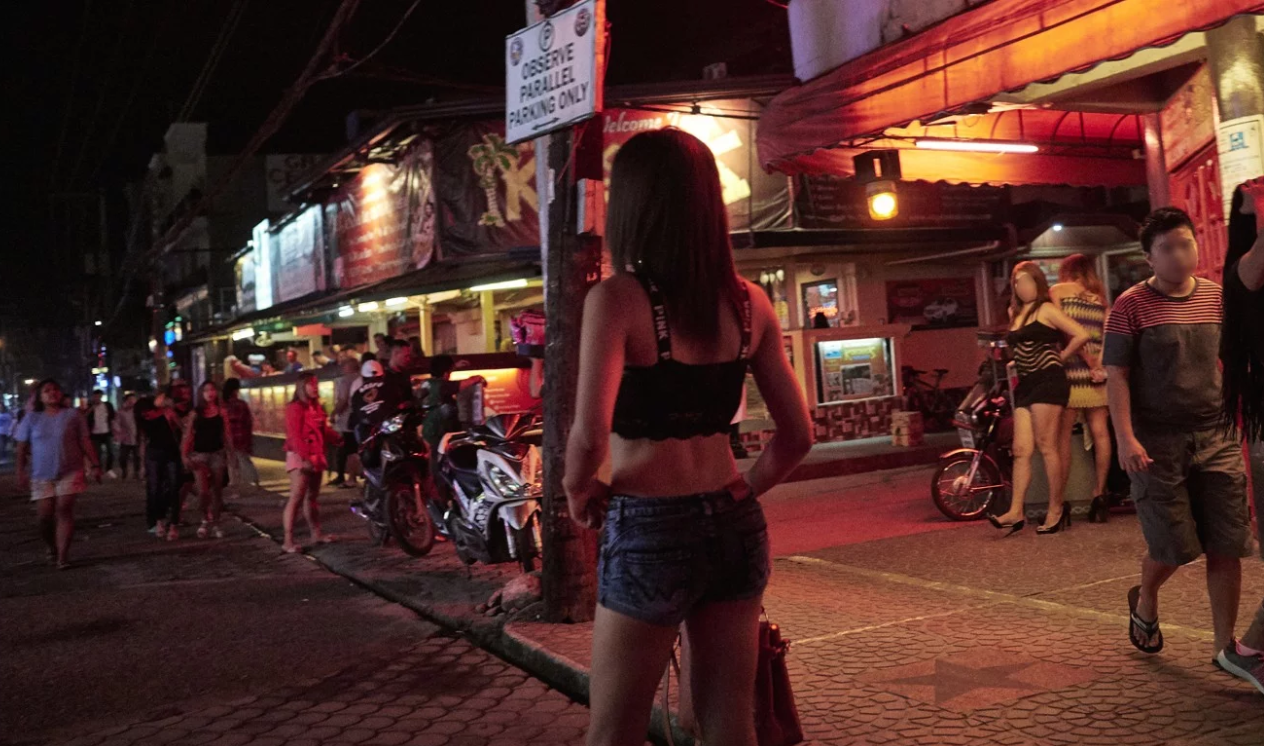Sixteen-year-old Julianne* was trafficked into the Philippine sex industry two years ago. She makes between US$40 and US$80 a week, which goes straight to her family of six.
As dusk falls and men flock to the bar where she works, she chews her nails nervously. The past week has been scarier than usual.
There has been a surge in foreign tourists to Angeles City, one of the 23 locations where the Southeast Asian Games (SEA Games) are taking place this year. A total of 8,750 athletes from 11 countries are competing in 531 events over the course of 12 days.
Julianne’s bar manager has threatened to dock waitresses’ pay unless they accompany men back to their hotels.
Officials say thousands of women and children have faced or could be facing increased sexual abuse, with government agencies failing to protect them ahead of the games
Both Angeles City and Subic Bay, located a few hours’ drive north of Manila, are internationally known as sex tourism destinations, and targeted by men from around the world.
Prostitution is illegal in the Philippines, and girls are not supposed to work in bars if they are under 18, but rules are easily broken, and birth certificates regularly exchanged.
Yvette Coronel, Secretariat for the Inter-Agency Coalition Against Trafficking [IACAT], a division of the Philippine Department of Justice, said the issue of sex trafficking was not considered ahead of the games.
“We probably should have, because Angeles and Subic are known hotspots for trafficking,” Coronel said.
“It’s not the athletes from other countries who are the risk,” she said. “It’s everyone who they bring with them: their team members and their coaches and the people who come to watch them. Girls in both those cities are very vulnerable.”
Father Shay Cullen, founder of the PREDA Foundation, a non-profit working to rescue children from foreign exploitation in Subic Bay and Angeles City, said he was not surprised by the government’s inaction.
“With hundreds of children being sexually abused daily by hundreds of sex bars; ignored by and approved by the government, do you think it is likely they would have much concern?” Cullen asked. He added there are currently 67 children living at the PREDA shelter.
Women and children from China and Vietnam are also being trafficked to provide sexual services during the games, with police rescuing more than 20 from multiple sites in Angeles City in the last 10 days.
But Rhea Mutuc, head of the Department of Tourism in Angeles City, said she was not aware of a rise in sexual exploitation during the SEA Games so far.
“It’s a sports event, so there is not much risk to the girls. But of course security is an issue we take very seriously,” she said. There is an increased police presence and medics have been placed on standby at all associated sporting venues.
The night before the SEA Games opening ceremony on November 30, the Angeles City Information Office said local authorities including the police had rounded up 44 freelance sex workers and massage therapists who could not provide an official ID. There was no mention of detaining any of the foreign men who crowd the red light district, or lead underage girls back to the numerous ‘short time’ hotels around the city.
Reema, 26, who works as a waitress in a Korean-owned bar along the city’s main entertainment strip, watched as a brass band made up of 15 uniformed policemen led a parade of dancers through the red light district to the tune of O’ Come, All Ye Faithful on December 6. “It’s all for showing off,” she said, annoyed. “They say there is more security, but this is it.”
She said the threat of arrest would deter most sex workers and trafficking victims from asking for help from the police in the first place.
Besides the Philippine government, activists and human rights advocates have remained quiet, in comparison to the many groups that adopted aggressive anti-trafficking stances ahead of international sporting events such as the 2018 Winter Olympics in Pyeongchang and the 2017 Asian Indoor and Martial Arts Games in Turkmenistan.
In 2018, regional child protection organisation Child Rights Coalition Asia publicly called upon the organisers of the Asian Games in Jakarta, Indonesia, to implement an extensive child-protection strategy ahead of the event – advising on emergency hotline numbers and information for tourists on Indonesian child exploitation laws. CRC Asia’s Manila office said no such statement was issued ahead of the SEA Games, but declined to provide a reason why.
Similarly, Unicef, which has previously partnered with international law enforcement to raise awareness around trafficking ahead of events such as the 2010 Football World Cup in South Africa, said it had not developed any campaigns or recommendations around child safety during this year’s SEA Games, and was unaware of any activities by partner organisations.
Reema wishes the welfare of women and children in Angeles City was taken more seriously. “It’s very bad, because the tourists see any girl, and they think ‘oh she’s Filipina, now I can buy her for sex’.
“It doesn’t matter what you’re wearing or if you’re holding your child or how old you are – the men still think they can grab you and touch you, because this is the Philippines and nobody tells them it’s not OK.”
For Julianne, the increased threat during the SEA Games is predictable. “I don’t expect people to help me,” she said, twisting a length of brown hair into a knot on top of her head. “I think being a girl here is always very hard.”
Names have been changed to protect the identity of interviewees.



